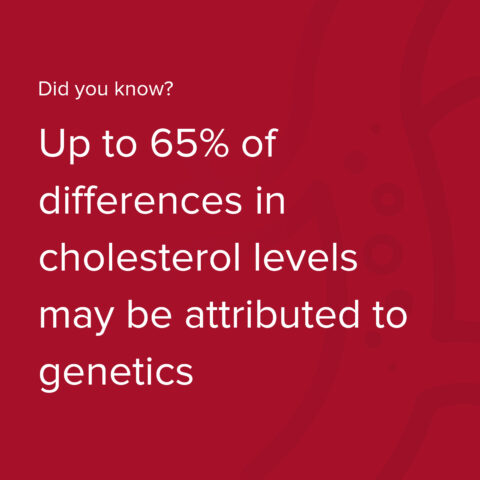
Worldwide, 71% of all deaths are from non-communicable diseases, the top one being heart diseases [1]. The top cardiovascular disease is coronary artery disease, and one of the top 3 risk factors is high cholesterol [2]. It’s no wonder then that it’s one of the most researched health topics, and should make you ask, “is high cholesterol genetic?” Let’s find out the answer.
Introduction To High Cholesterol And Genetics
Your blood test comes back indicating high cholesterol levels. Your doctor asks you if there’s a history of high cholesterol in the family, and gives you a list of things you can do to lower it.
Odds are you’ve heard this yourself or know of someone who has been through this. It’s one of the more common health issues and pieces of advice given around the world.
Like many pieces of advice, you seldom should take them at face value. There’s almost always more to it, and a generalization of information that doesn’t always take your own unique variables into consideration.
Unfortunately, high cholesterol and genetics are not a connection many people make. So, let’s take a deeper dive into what should be considered.
Some Facts About High Cholesterol
People think of cholesterol as being bad, but it’s actually essential. Cholesterol gives shape to all of your cells, helping to form the outer membrane. Your body also uses it to make vitamin D, some types of hormones, and is used to make bile in order to break down fats [3].
Yes, too much dietary cholesterol can be bad for you, but your body needs healthy levels. In other words, if everything is working as it should, it’s not something to avoid.
Your liver actually produces most of the cholesterol that your body needs in a complex, 37 step process [4]. The bit extra comes from what you eat, so it’s important to make sure that you aren’t tipping your system in the wrong direction. You want your liver to like what you eat.
There are two major types of cholesterol, LDL-C and HDL-C. These are low and high-density lipoprotein cholesterol, respectively. We call HDL cholesterol “good cholesterol” because it helps your liver get rid of excess cholesterol. On the other hand, LDL cholesterol is “bad” because it can stick to your blood vessels. This can cause heart problems [3, 5].
When you consume too much saturated fat, your liver ends up over-producing LDL cholesterol. Your body can’t get rid of it all, and so the extra starts depositing itself on your blood vessel walls.
Some saturated fats are actually fine to consume in moderation, like coconut oil for example. Others, called trans fats, are the product of the food industry, processed to make fats solid at room temperature [6]. They serve no useful purpose in your diet.
In the end, like most things in your body, it’s about balance. LDL cholesterol is a normal part of your body’s processes. Eat healthy and you will generally be alright. Sometimes though, just eating healthy is not enough to lower your risks for high cholesterol. Genetics can be involved, but how?
What Are The Risk Factors For High Cholesterol?
Not surprisingly, things that are risk factors for one health issue are the same for others. Systems within your body are interconnected in so many ways. Often, one thing connects with multiple others, like cholesterol, which gets used all over the body. So you will see a lot of similarities between health issues.
Some risk factors for high LDL cholesterol include [7, 8]:
- A diet high in saturated fat
- Obesity
- Lack of exercise
- Older age
- Smoking
- Diabetes
- Medications
- Underactive thyroid
- Family history (genetics)
If your cholesterol levels rise, your doctor will recommend strategies for lowering them. These may include [5]:
- A diet low in saturated fat
- The Mediterranean diet
- Exercise
- Losing weight
- Stop smoking
One thing they won’t typically ask you is if you have any genetic mutations affecting your risks. They will ask you if anyone in your family has dealt with high cholesterol, but how often do people know or have access to that kind of information? That’s why you become proactive and find out for yourself!
Is High Cholesterol Genetic?
Cholesterol is extremely important. It has a wide range of functions across your body and is part of cell membrane structure. So, it would make sense that there are a number of genes involved in its processes. In fact, humans have over 100 genes that affect cholesterol production, movement, and breakdown [9, 10].
That’s a main reason why up to 65% of the differences in people’s cholesterol levels may be attributed to genetics. Genes that may contribute to high cholesterol influence cholesterol production, transport, and the balance between HDL and LDL cholesterol [11, 12, 13, 14, 15, 16].
When it comes to high cholesterol and genetics, a gene with direct influence is the APOB gene. This gene codes for two versions of a protein, one that helps transport fats from the intestine through the bloodstream, and the other in the liver to help produce LDL.
A research study involving several hundred men indicated that the SNPs rs1042034 and rs676210 were significantly associated with high cholesterol [17]. It should be noted that age, BMI, and alcohol consumption were also factors in the subject’s high cholesterol, not only genetics.
This is just the tip of the iceberg with this gene. There are at least 100 mutations in this gene alone that can lead to familial hypercholesterolemia, a condition that alters the LDL’s ability to bind to receptors in cells. This leads to abnormally high levels of cholesterol in the blood at a younger age.
The point here is that there are many ways that your genes can influence your risks of high cholesterol. This is why doctors will recommend you start getting your levels checked even as a teenager.
What Can Analyzing Your DNA Tell You About High Cholesterol?
Having your DNA analyzed can help you understand what risk factors are relevant to you based on your genes and what you can do to address them.
The SelfDecode Cholesterol report allows you to optimize your health by uncovering what your genes are doing behind the scenes to affect your odds of struggling with high cholesterol.
Not only does high cholesterol have a genetic component, but your genes can also influence how well you respond to strategies to maintain healthy levels.
A good example of just how effective and easy it can be to make relevant and proactive adjustments based on your DNA analysis is with the TCF7L2 gene. A variant in this gene may increase cholesterol levels relative to those without the variant.
Contrary to what many people think, knowing which variant you carry can give you an advantage. Researchers found that sticking to the Mediterranean diet may completely cancel out this TCF7L2 gene variant effect [18]! A five-year follow-up also found that those sticking to the Mediterranean diet were significantly less prone to strokes [18].
But that’s only one gene related to high cholesterol. SelfDecode analyzes over one million genetic variants in the cholesterol report to give you the most precise data.
Unlike other DNA companies, SelfDecode goes a step beyond merely highlighting your genetic risk for high cholesterol. Your report also comes with evidence-based diet, supplement, and lifestyle recommendations to help you lead a healthier life.
Concluding Remarks About High Cholesterol And Genetics
Healthy cholesterol levels are vital to your overall health. It’s one of those issues that has so many potential genetic risk factors, and modern day living isn’t overly conducive to maintaining a balance.
This is why you want to keep track of it throughout your life. Don’t ignore it, because your body’s way of telling you is usually through a catastrophic trip to the emergency room. Now that you know more about high cholesterol and genetics, maybe it will help you find new ways to manage your levels.
Be proactive and start today by investigating your DNA to discover your genetic predispositions to high cholesterol. For a gene-based approach, you should check out SelfDecode.
Watch the founder and CEO of SelfDecode Joe Cohen and biohacker Siim Land discuss cholesterol:
Related Articles
- Plant Sterols And Cholesterol: Can It Help Your Heart Health?
- Is Heart Disease Genetic? Risk Factors And How To Manage




